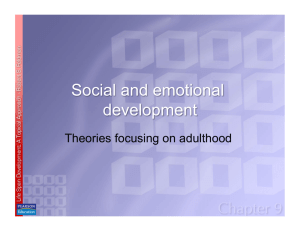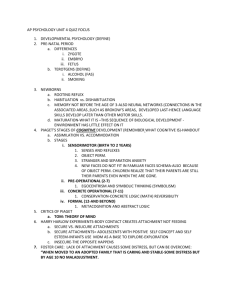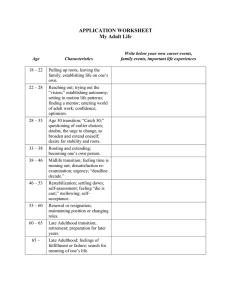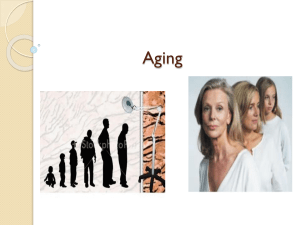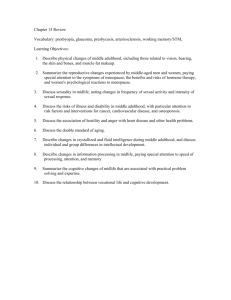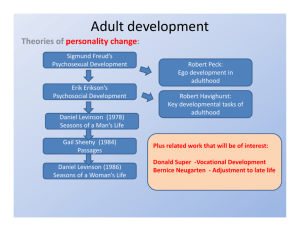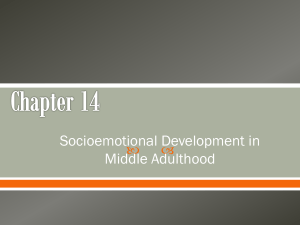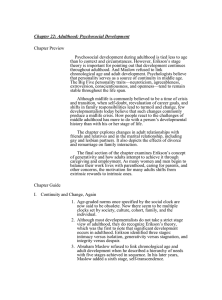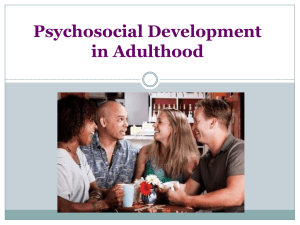ADULTHOOD D E V E L O P M E N... E S C A P E !
advertisement
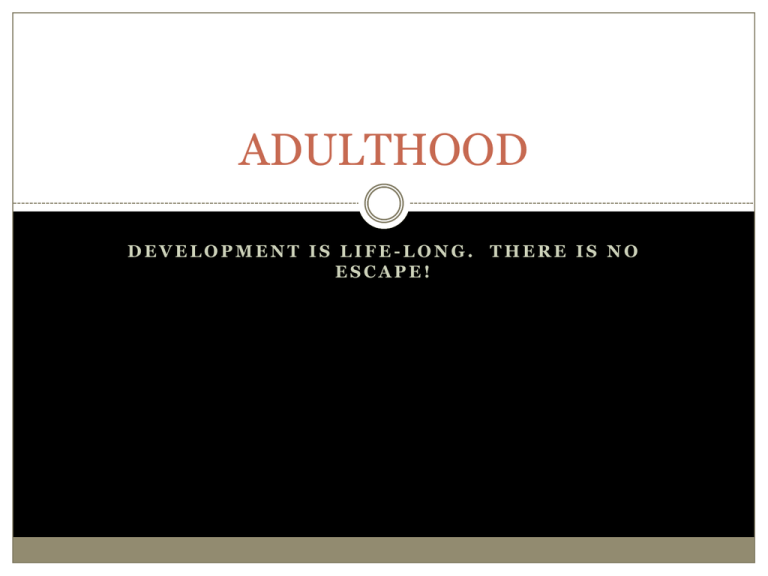
ADULTHOOD DEVELOPMENT IS LIFE-LONG. THERE IS NO ESCAPE! SOCIAL CLOCK DEF: a person’s notion of a developmental schedule that specifies what he or she should have accomplished by certain points Expectations may lead to stress PERSONALITY STABILITY Personality does change over the years Still, it is very durable Personality in early adulthood is a strong indicator of personality in late adulthood Stability of personality strengthens with age MIDLIFE CRISIS DEF: a difficult, turbulent period of doubts and reappraisal of one’s life Not typical; only 2-5% More women tend to experience midlife crisis, but on a healthier level ERIKSON’S VIEW OF ADULTHOOD Adulthood divided into 3 stages Intimacy vs. Isolation: early adulthood; empathy and openness; sharing intimacy w/others Generativity vs. Self-Absorption: middle adulthood; acquire concern for younger generations; guide the young Integrity vs. Despair: retirement years; find meaning and satisfaction with one’s life ERIKSON’S VIEWS Theory fairly solid Generative concerns in middle adulthood are assoc. with higher life satisfaction Higher generativity adults are more open to new experiences TRANSITIONS IN FAMILY LIFE Family life cycle: sequence of stages that families tend to progress through Family dynamics have changed considerably in the last 2 decades Typically: most people start their own families ADJUSTING TO MARRIAGE Marital role expectations differ btwn men and women Satisfaction in marriage seems to be highest at the beginning and end of family life cycle ADJUSTING TO PARENTHOOD Women are vulnerable to postpartum depression Marital quality associated with satisfaction with parenting Don’t underestimate cost of child rearing Parent-child conflict affects the mother the most ADJUSTING TO EMPTY NEST Seen as a difficult period Parents now have more attention to give one another Currently, mothers see empty nest as a liberation TYPICAL PATTERNS OF CAREER DEVELOPMENT Donald Super’s vocational life cycle (4 stages) Exploration Stage: finishing school, finding first job Establishment Stage: guided by a mentor in career Maintenance Stage: concerns shift to family or leisure Decline Stage: retirement looms; anxiety about occupation of time and financial survival WOMEN’S CAREER DEVELOPMENT Studies focused on men until mid 1970s Women’s dev. less predictable More interruptions than men Gender discrimination also plays a role AGE AND PHYSICAL CHANGES Physical changes have little functional importance Number of active neurons in brain declines Dementia: abnormal condition marked by multiple cognitive deficits that include memory impairment Dementia effects about 15% of people over age 65 AGE AND PHYSICAL CHANGES CONTINUED Hearing and vision decline Hearing losses requiring correction exist in about 75% of people over 75 Hormonal changes: women experience menopause (c. age 50) AGING AND COGNITIVE CHANGES Fluid Intelligence: basic info-processing skills Crystallized Intelligence: application of accumulated knowledge Fluid is more likely to decline with age Memory effect is moderate; not universal Mental speed does decline
